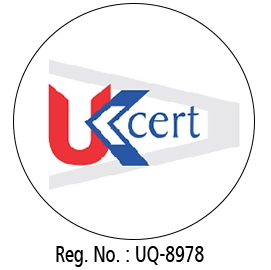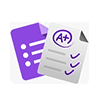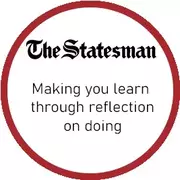.webp)
Register in October and get 3 months of membership, absolutely free!
Henry Harvin® Ranks No.1 for Language Courses by Economic Times
 featured Henry Harvin 4.8 / 5
featured Henry Harvin 4.8 / 5 




Master A1, A2, B1, B2, C1, and C2 Levels of the Dutch Language and re-launch your career | Immerse yourself in the language, culture, and literature of the Dutch-speaking world while gaining valuable skills and knowledge | Learn from Native Speaking Experts and improve your skills
By submitting this form, you agree to receive SMS communications related to courses at Henry Harvin I have read and acknowledge Henry Harvin’s Privacy Policy and Terms & of Service Message & data rates apply. Message frequency varies. Reply HELP for help and STOP to opt-out.
Placed Learners





















.webp)
.webp)
.webp)
.webp)
.webp)
.webp)
.webp)
.webp)
.webp)
.webp)
.webp)
.webp)





There's a reason that 95% of our alumni undertake 3+ courses as a minimum with Henry Harvin®
.webp)
Henry Harvin® Dutch Language Course offers a comprehensive and immersive learning experience that will enhance your proficiency in the Dutch language and deepen your understanding of the rich culture and literature associated with it. Our Dutch language course is designed to equip you with the necessary skills to communicate effectively in Dutch. Whether you are a beginner or already have some knowledge, these Dutch classes will help you develop fluency in speaking, reading, and writing Dutch.
It is a versatile 10-in-1 program that includes various aspects of competency development and career development.
A1: 56 hours
A2: 56 hours
B1: 66 hours
B2: 66 hours
C1: 66 hours
C2: 66 hours
Become a part of the Elite School of Languages of Henry Harvin® and join the 4,60,000+ large Alumni Network Worldwide.
Know the complete offerings of our Dutch Language Training Course
.webp)





.png)


.png)




.webp)

Average salary hike
Access the best jobs in industry

Maximum salary hike
.webp)

.webp)
Two-way Live Training Course
Two-way Live Online Interactive Classroom Sessions
.webp)
Certification
Distinguish your profile with credentials and showcase expertise with our Hallmark Completion certificate
.webp)
Projects
Facility to undergo various projects along with the course.

Guaranteed Internship
Get a guaranteed Internship with Henry Harvin® and in top MNCs like J.P. Morgan, Accenture & many more via Forage.

Placement
Get 3 in 1 Placement support through Placement Drives, Premium access to Job portal & Personalized Job Consulting
.webp)
Student Engagement & Events
Free Access to #AskHenry Hackathons and Competitions & many other facilities from Henry Harvin®
.webp)
Masterclass
Access to 52+ Masterclass Sessions for essential soft skill development

Membership
Get Free Gold Membership of Henry Harvin®
.png)
E-Learning Access
Free access to the E-learning Portal and future updates. Get access to PPTs, Projects, Quizzes, self-paced Video-based learning, a question bank, a library, practice tests, final assessment, a forum, and doubt sessions.
.webp)
Entrepreneurship Mentorship
Mentorship from Young Successful Entrepreneurs to set up a sustainable & scalable Business from scratch at both Freelance and entrepreneur levels
.webp)
.webp)
.webp) Module 1: Dutch A1 Level
Module 1: Dutch A1 Level
Say hello and goodbye.
Introducing someone and reacting to being introduced. (Meet people).
Ask for forgiveness.
Give the thanks.
Point out that it is not understood.
Ask someone to speak more slowly or louder.
Request a repetition of what was said.
Spell out and request to be spelled.
Request that something is written.
Identify people, places, and objects.
Describe people, places, and objects.
Refer to current or habitual actions.
Refer to plans and projects.
Express agreement and disagreement.
Express knowledge or ignorance.
Express and ask if it is possible or not to do something.
Express and ask for desire and need.
Invite and offer something. Accept or decline invitations and offers.
Start and end the speech
Ways of greeting and presentation
Use of the language in various social situations
Basic phrases (greetings, farewells).
Important Commands for the class.
Basic questions (what, how, which, all questions).
Survival phrases, invitations, requests, etc.
Alphabet. Basic concepts of pronunciation and intonation.
The noun. The adjective. The concordance. Articles.
Days of the week, months, and seasons of the year.
The numbers.
Pronouns.
Adverbs of place.
Basic prepositions of place.
Verb do (depends on the student, you can go before).
Regular present.
Present Irregular (more frequent).
Uses of knowing and knowing.
Some modal verbs: power, want, have to.
Most frequent reflexive verbs.
Verbs like.
Basic conditional.
Past Indefinite, the most frequent regular and irregular verbs
Lots of speaking/(inter) active practice
Spelling
Lots of listening (dialogues)
Pronunciation
Exercises and Language-Learning activities, such as role-plays
.webp) Module 2: Dutch A2 Level
Module 2: Dutch A2 Level
Compare people, objects, places, and situations.
Express and ask for opinions about something or someone.
Express and ask about the degree of security.
Express and ask for the obligation to do something.
Ask, grant, and deny permission.
Express and ask for satisfaction and desire
Express and ask for preferences.
Express and ask for needs.
Express and ask about physical sensations and pain.
Suggest activities and react to suggestions.
React to a story with expressions of surprise, interest, joy.
To congratulate.
Address someone.
Relate elements and parts of speech.
Verify that what has been said has been understood.
Asking for a word or expression that is unknown or has been forgotten.
Express and ask for desire and need
Invite and offer something. Accept or decline invitations and offers.
Start and end the speech
Social codes: invite, offer, reject.
Social behaviors when giving and receiving gifts in countries.
The importance of meals in family and social relationships.
General review of the contents of A1.
Extension of the irregular program A1.
Extension of modal verbs.
Other verbs like ""LIKE"": hurt, annoy, seem.
Imperfect Past (regular and irregular)
The general alternation between Preterite Indefinite and Imperfect.
Future of Indicative.
The 1st conditional: Yes + Present + Future.
Some modal verbs: power, duty, have to.
Direct and indirect object. Pronoun placement.
Regular Imperative You and You
.webp) Module 3: Dutch B1 Level
Module 3: Dutch B1 Level
Conversation about present, future & past events, and describing a situation
Explaining habitual actions
Talking about memories
Making Comparisons
Explaining anecdotes
Expressing feelings such as happiness, pity, surprise, fear
Expressing how long you have been doing an action for
Sentence and word building
Describe feeling
Express Present Wishes and Future Wishes
Express Problems and give advice
How to give order and instructions
Passing messages
Reported speech
Imperfect tense
Past simple vs. Imperfect past
Prepositions
Different clause types
Present subjunctive
Imperative
Conditional tense
Pronouns and prepositions
Different clause types
Literature overview
Vocabulary words differently in different countries
Different indigenous peoples and their customs and habits
Variety of food in all the speaking countries
Aspects of Personality and habits
Talking and active practice
Listening practice
Pronunciation
Reading and Writing
.webp) Module 4: Dutch B2 Level
Module 4: Dutch B2 Level
Express opinion and argue with people
Talk and describe past events
Express doubts and probability
Give opinions and recommend films
Complain about things and situations
Demand things
Use gesture to communicate
Ask for advice and react to advice
Make a hypothesis about past events and explain it
Make a hypothesis about future
Revision of present subjunctive tense, conditional tense, imperative tense, and all past tenses.
Uses of all past tenses
Direct and indirect pronouns
Future tense
Expresion to use when you argue like: me molesta que…,no soporto que…, me sorprende que..
Present, past perfect, and past imperfect subjunctive.
Second conditional sentences.
Future simple.
Conditional simple y compuesto.
Revision of imperative tense affirmative and negative.
Pronouns, prepositions.
Different clause types
Telling jokes
Idioms
Introduction to poetry
Arts and Literature and music
How is life in modern cities in Latin America
Slang vocabulary and expressions
Active oral practice
Listening
Debates
Accents
Reading and some Writing
.webp) Module 5: Dutch C1 Level
Module 5: Dutch C1 Level
Describe and value people.
Definition and description of objects.
Relate moments from the past.
Express prohibition.
Express obligation.
Highlight or give importance to something.
Recommend and advise.
React by showing our feelings.
React to other peoples wishes.
Express likes wishes and feelings.
Show skepticism.
Express wishes that are difficult or impossible to fulfill.
Formulate hypotheses in the present and past.
Against arguing.
Compare objects and people.
Express agreement and disagreement.
Express approval and disapproval.
Argue and debate.
Summarize arguments.
Convey orders, requests, and advice (in the present and past).
Transmit messages (in present and past).
Repeat a previous or budget order.
Sequence arguments.
Structure the speech.
Give coherence to a text.
Make literary use of language.
Narrate using different tenses
Advanced uses
Verbs and verbal periphrasis of transformation and change.
Review of the affirmative and negative imperative with pronouns.
Uses of having and carrying in physical descriptions.
Verbs with prepositions.
Although indicative and subjunctive.
Subjunctive revision (present, imperfect, and past perfect).
Review of classes of conditional sentences.
More colloquial expressions.
The pluperfect subjunctive.
He is impersonal.
Connectors (additive, counter-argumentative, causal, consequential, ordering of discourse).
Frequently used prefixes and suffixes.
The indicative vs subjunctive.
Time correlation in the indirect style.
Derivation of adjectives from nouns.
Comparative constructions.
Neutral pronouns.
Leísmo, Laísmo, Loísmo.
Other periphrases.
Synonyms and antonyms.
The accentuation and general rules of spelling.
Interpretation and production of short literary texts
Identification of variants of Dutch.
Intonation, accent, and rhythm in-variants of Dutch
.webp) Module 6: Dutch C2 Level
Module 6: Dutch C2 Level
Judge and value.
Express hypotheses.
Complain and lament.
Express likes wishes and preferences.
Encourage and reassure.
Recommend and advise.
Influence the interlocutor.
Contrast and compare ideas.
Structure the speech.
Relate or add information.
Point out opposition, processes, results, and circumstances.
Alluding to themes or interpretations of others.
Repeat and tell what was said by another.
React to new information by referring to previous knowledge.
Recognize and use discourse markers indicating processes, results.
Circumstances and temporal reference.
Extract relevant information and make a summary.
Give compliments and react to compliments.
Production of different kinds of texts.
Review of all the subjunctive tenses.
Subordinate substantive clauses.
Subordinate adjective clauses with indicative and subjunctive verbs.
Causal subordinate clauses with verbs in Indicative and subjunctive.
Consecutive, concessive, comparative, final, and conditional sentences.
Verbs that alternate indicative and subjunctive with the change of meaning and intentional nuances.
Mode sentences (as and as, as, the same as if, as if ...).
Other colloquial expressions.
The indirect and direct style.
Verbs that introduce the referred speech.
Uses of the + adjective.
More discursive markers.
Process of the derivation of adjectives to verbs.
Values of yourself.
Prepositional phrases.
Adverbial phrases.
Review of the rules of spelling and stress.
Production and analysis of written texts
Identification of variants of dutch
Intonation, accent, and rhythm in-variants of Dutch
Know the complete offerings of our Dutch Language Training Course
Days
00Hours
00Minutes
00Seconds
00By submitting this form, you agree to receive SMS communications related to courses at Henry Harvin I have read and acknowledge Henry Harvin’s Privacy Policy and Terms & of Service Message & data rates apply. Message frequency varies. Reply HELP for help and STOP to opt-out.
.webp)
Reading Comprehension
Grammar and Vocabulary
Effective Communication
Research Skills
Cultural Analysis
Translation Skills
.webp)
.png)

.webp)
.webp)
Know more about the value of this certificate in the industry
.webp)


We are dedicated to supporting our students throughout their career journey. Join us, and let's embark on a journey towards a successful and fulfilling career together.

Exclusive access to our dedicated job portal and apply for jobs. More than 2100+ hiring partners’ including top start–ups and product companies hiring our learners. Mentored support on job search and relevant jobs for your career growth.

Share what kind of job you are looking for and we will provide you with verified job openings that match your requirement.
.webp)
Translator/Interpreter
Language Trainer
Tour Guide
Foreign Correspondent/Journalist
Cultural Liaison Officer
International Relations Specialist
International Sales/Marketing Representative
Customer Service Representative
Administrative Assistant
.webp)
Language Translator , International Sales or Marketing Representative, Customer Service Representative, Tour Guide , Language Teacher or Tutor, Cultural Liaison Officer, International Relations Specialist , Content Writer or Editor
.webp)
No prior knowledge of Dutch is required. The Dutch language course is suitable for beginners as well as individuals with some basic understanding of the language.
Attend our Dutch classes to master the language and explore unlimited opportunities with our prestigious and comprehensive language course for Dutch.
Our Dutch language course utilizes a combination of interactive lectures, practical exercises, audiovisual aids, and personalized guidance to facilitate effective learning.
Attend our Dutch classes to master the language and explore unlimited opportunities with our prestigious and comprehensive language course for Dutch.
Yes, upon successful completion of the Dutch language course, you will be awarded a certificate by Henry Harvin, which can add value to your professional profile.
Attend our Dutch classes to master the language and explore unlimited opportunities with our prestigious and comprehensive language course for Dutch.
Yes, all the Dutch language course materials and resources are available online through our learning management system (LMS), which allows you to study at your own pace and convenience.
Attend our Dutch classes to master the language and explore unlimited opportunities with our prestigious and comprehensive language course for Dutch.
Yes, periodic assessments and evaluations will be conducted to gauge your progress and provide valuable feedback on your learning journey.
Attend our Dutch classes to master the language and explore unlimited opportunities with our prestigious and comprehensive language course for Dutch.
Yes, we offer personalized coaching sessions and additional support from experienced trainers to address your queries, clarify concepts, and provide guidance throughout the duration of the Dutch language course.
Attend our Dutch classes to master the language and explore unlimited opportunities with our prestigious and comprehensive language course for Dutch.
The Dutch language course is typically designed to be completed within 370 Hours, depending on the program you choose and your learning pace.
Attend our Dutch classes to master the language and explore unlimited opportunities with our prestigious and comprehensive language course for Dutch.
.webp)
.webp)
Henry Harvin®️ ranks amongst the Top 500 Global Edtech Companies with 4,60,000+ Alumni, 900+ B2B Clients, 500+ Award Winning Trainers, and 1200+ Courses.
Trained
.webp)
Gold Membership & Post Training Followups
Tailor Made Training
Flexible Schedule
Access to the Recorded Sessions
10 in 1 Program
Masterclasses By Henry Harvin®️
One-to-One Training
.webp)




.webp)






.webp)
.webp)